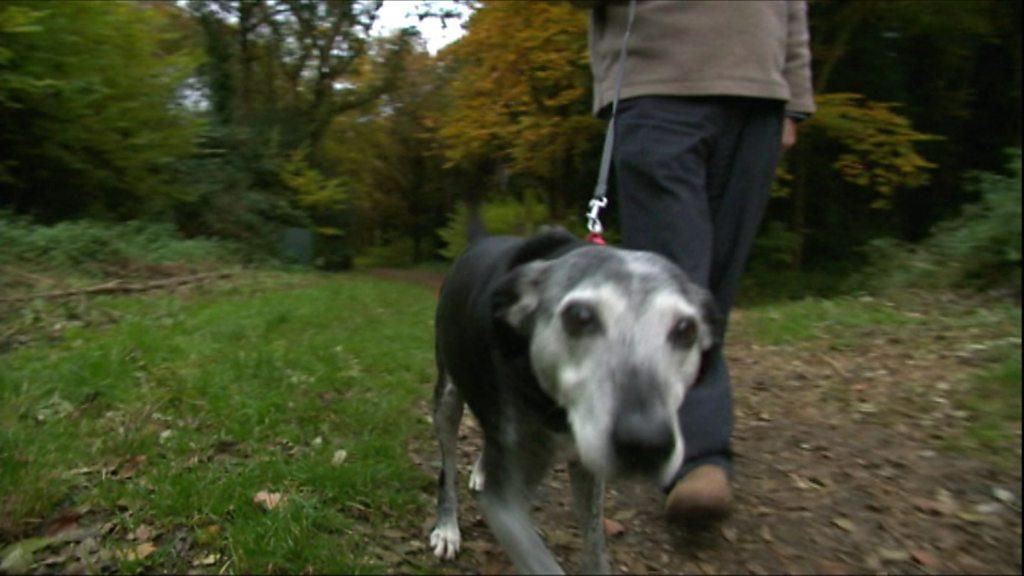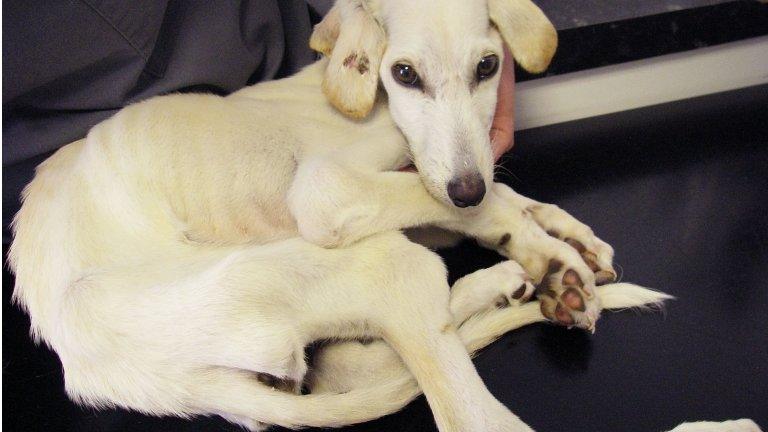RSPCA should rein in prosecution role, say MPs
- Published
- comments
RSPCA took my healthy dog away says agoraphobia sufferer
The RSPCA should withdraw from routinely prosecuting animal welfare cases, according to MPs.
The Commons environment committee said there was a "conflict of interest" between the charity's power to prosecute and its role in investigating cases, campaigning and fundraising.
But the RSPCA defended its work and said the move was not supported by the government or animal welfare groups.
The government says it will consider the committee's recommendations.
The Environment, Food and Rural Affairs committee called on ministers to change the law concerning the RSPCA's role.
Everyone in England and Wales has the right to bring a private prosecution against someone who they believe has committed an offence.
The Committee recommends, external the RSPCA should continue its work investigating animal welfare cases, but "withdraw from acting as a prosecutor of first resort" and let the Crown Prosecution Service or other statutory bodies carry out this role.
If there were no statutory alternatives - and where a private prosecution would further its charitable aims - the RSPCA could still be allowed to bring a case, said the committee.

What prosecution powers does the RSPCA have?
The RSPCA exercises its right to act as private prosecutor under the Prosecution of Offences Act 1985.
The charity has no legal enforcement powers or authority in its own right, so all prosecutions are brought via independent solicitors acting for the RSPCA.
The director of public prosecutions does have the right to intervene in any criminal proceedings if she feels that proceedings are unjustified.
Other charities have brought prosecutions in cases where the police or CPS haven't taken action.

The committee report also highlighted a dramatic rise in numbers of imported puppies from eastern Europe.
Puppies can be imported for commercial purposes or moved as pets under the EU Pet Travel Scheme (PETS).
Between the introduction of PETS in 2011 and 2015, the report points to a 2,055% increase in the number of dogs entering the UK from Romania. There was an 850% increase from Lithuania and a 761% rise from Hungary in the same period.
The committee recommended the government increase spot checks at entry points into the UK and that the age at which dogs can be brought in to the UK should be increased from 15 weeks to six months in order to reduce their commercial value to smugglers.

Commenting on the recommendation to the RSPCA, Conservative MP and chairman Neil Parish said the committee was not convinced the charity was in any better position to prosecute than the CPS and "should step back from making prosecutions itself".
Evidence heard included testimony from the Self-Help Group (SHG) for farmers, pet owners and others experiencing difficulties with the RSPCA which said some people felt alienated by the charity's "targeting of vulnerable, ill or elderly people" and the removal of their animals.
RSPCA chief executive Jeremy Cooper rejected the MPs' criticism.
"We are extremely proud of our near 200 years of experience investigating and prosecuting animal cruelty and our 92% success rate - which is currently a higher percentage than the CPS," he said.
But Tim Bonner, Chief Executive of the Countryside Alliance, who have been critical of the RSPCA, told the Today Programme: "The RSPCA is in a position that no other private organisation is.
"They retain this prosecution role which all other charities and private individuals gave up in the 80s when the CPS was formed."
Speaking to BBC Breakfast the RSPCA's head of public affairs, David Bowles, said most of the charity's work was "about educating people to take care of their animals much better".
Last year the RSPCA spent £4.9 million on legal fees and cases. Mr Bowles said that represented about 3% of the charity's budget.

RSPCA prosecutions
Complaints of cruelty investigated by the RSPCA rose from 153,770 in 2013 to 159,831 in 2014 in England and Wales
In 2014, this led to 1,132 prosecutions
The charity's prosecution success rate is 98.9%, according to 2014 RSPCA figures

In a joint statement, Battersea Dogs and Cats Home, Blue Cross, Cats Protection, the Dogs Trust and the PDSA said they feared that without the RSPCA, "many cases of unacceptable animal abuse would go unprosecuted".
The committee also recommended the maximum penalty for animal welfare crimes should be increased from 51 weeks to five years.
And it called for a ban on the third party sale of dogs, so they would only be available from licensed, regulated breeders or approved rehoming organisations.
Neither the SSPCA (the Scottish equivalent of the RSPCA) nor the Ulster Society for the Prevention of Cruelty to Animals (USPCA) bring prosecutions, as the RSPCA does in England and Wales.
Correction 11 April 2017: This page, first published on 16 November 2016, has been amended following a complaint that was upheld by the BBC's Editorial Complaints Unit.
- Published16 November 2016

- Published22 September 2015
